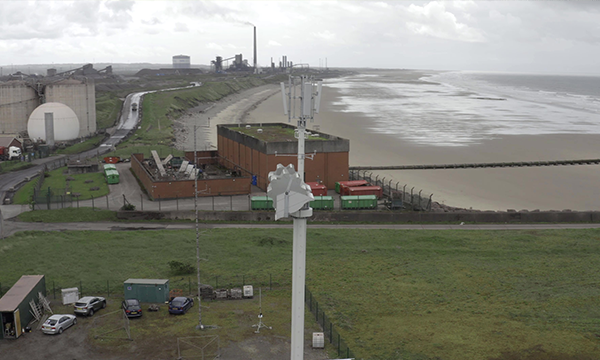An innovative new mobile telephone mast powered through a pioneering wind turbine, which has the potential to support Wales’ ambitious net zero target and bring telecoms connectivity to ‘not-spots’ in rural areas has been developed by a south Wales-based company.
Baglan-based Crossflow Energy’s revolutionary mast incorporates a wind turbine, solar panels, and on-site battery storage.

The project is just the latest innovation resulting from support from the Welsh Government’s European Union (EU)-funded SMART programme.
The Crossflow project is a textbook illustration of the holistic way this support works:
- A Welsh Government innovation specialist formed a long-term, one-to-one relationship with the company. They worked together to assemble bids for nearly £1m of grants through various SMART Cymru research and development (R&D) rounds
- When the company needed specific academic collaboration, it was introduced to Swansea University
- When the technology was ready for commercialisation, the Welsh Government introduced Crossflow to Vodaphone, who are now beginning to roll-out the technology.
- Starting with a demonstrator in Pembrokeshire, Crossflow now wants to provide communities across Wales with mobile phone signals powered by sustainable, clean energy, and has plans to sell the technology world-wide.
A survey of nearly a third of the 486 companies supported by SMART up to 2021 found a total of 3,000 new jobs were created – around 19 jobs per business – with an average turnover growth of £3.8m per business. These figures continue to grow as the beneficial effects of innovation endure within businesses.
Between 2015 and 2020, a £73m investment by the Welsh Government and EU in SMART programmes leveraged £287m from the private sector, supporting over 1,450 new R&D projects.
Economy Minister, Vaughan Gething, said:
“Thanks to EU-funded innovation programmes, business across Wales have been able to take new ideas from the drawing board and bring to life new, innovative, and dynamic products and services. Their innovation, backed by the Welsh Government, is helping to create thousands of new jobs in communities across the country.
“Many of these products and services are now being used in our day-to-day lives, helping to improve society for the better while boosting our economy and our prosperity as a nation.
“A great example of this is the innovative work being undertaken by Baglan-based Crossflow. Their revolutionary design concept for a mobile telephone mast powered by renewable energy is now subject to world-wide attention and interest.”
But the ending of EU funding leaves the Welsh Government with a £1.1 billion hole in its budget between now and 2025, which threatens the scale and reach of this R&D support.
In the light of this, the Minister is calling on the UK Government to urgently honour its promise to increase the level of public investment in R&D outside the South-East of England by at least 40% by 2030, and to ensure all parts of the UK reach its R&D investment target of 2.4% of GDP by 2027.
Welsh universities and businesses are also being denied access to other EU funding programmes like Horizon and European Territorial Co-operation programmes, which means significantly less funding for innovation projects. During the last round of EU funding (2014-20), over £500m was invested in Research and Innovation, including £68m for the SMART programme.
Welsh businesses previously supported through SMART attracted £9.2m of investment from Horizon 2020, the EU’s flagship Research and Innovation programme, which enabled them to collaborate in ground-breaking international projects.
In 2014-20, Wales secured €150m in Horizon 2020 funds, took part in over €2 billion worth of projects with over 6,000 partners across a wide range of subjects, from international safety standards for nanotechnology on helmets, to developing products from agricultural waste.
With the UK’s exit from the EU, Wales’ engagement in successor programmes is now in doubt.
The Minister added:
“We want to see more Welsh companies thrive through innovation, but EU funding has been crucial in supporting projects.
“The current UK Government approach effectively takes more than £1.1bn of money that was previously in the Welsh Government budget, makes councils compete for a fraction of it, and presents it as evidence of levelling-up in Wales. That is not levelling up, it is levelling down.
“The direct impact is that major investments in job creation, business support, R&D, skills and tackling poverty are now not taking place in Wales that otherwise would have.
“I am again calling on the UK Government to restore the missing £1.1bn in Wales’ budget and to respect devolution. UK Ministers must work with the Welsh Government to implement a replacement funding programme that works for Wales, not against Wales.”







